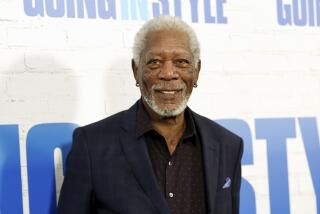Ken Burns Links the Civil War With Gulf Crisis : Television: In a speech before the World Affairs Council, the maker of the hit PBS series lambastes the medium for failing to live up to its educational promise.
- Share via
Ken Burns, who made television history with “The Civil War” for PBS last fall, went before the Los Angeles World Affairs Council Monday night to talk about “Television and History”--and wars. On Tuesday, while Burns was flying to New York to audio-tape the series’ $50 best-selling companion book, Vice President Dan Quayle addressed the council on the “Crisis in the Gulf.”
In a way, so had Burns.
The shadow of war in the Persian Gulf loomed over Burns’ remarks even as he reminisced about Lincoln and Sherman and Stonewall Jackson, and as he mentioned such foot soldiers as Elijah Hunt Rhodes of the North and Sam Watkins of the South in America’s bloodiest war.
In fact, the baby-faced, 37-year-old filmmaker seemed to make a point of relating that 19th-Century war to current events. A recurring theme in Burns’ talks, as he mentioned again, is “William Faulkner’s great message: ‘History is not was ,’ he said, but is .’ ”
With regard to the gulf crisis, Burns, who created, directed and co-produced the 11-hour “Civil War” series that aired over five consecutive nights to record audiences for public television, appeared to be offering at the least a message of extreme caution.
“In our enthusiasms as a species to go to war, we forget its real cost,” he said. “If we entered the fighting knowing what really came home in those opaque, sanitized body bags, if we knew we would have to list the dead again in yet a new memorial of crushingly personal anguish, if we knew, as history shows us time and again, that eventually the ‘better angels of our nature’ will always seek reconciliation with our enemies, would we be so enthusiastic? So forgetful?
“The Army of the Potomac’s finest moments, I believe, were in brotherly embrace with the veterans of the Army of Northern Virginia at the end of the war,” Burns added. Noting that “we now seek out” the Germans and Japanese at “poignant reunions,” that “the Germans now generously feed the Russians” when a generation ago they “starved millions of them to death,” that recently “television carried news of a Vietnamese soldier here in this country on a mission of reconciliation,” Burns asked: “Have we not learned? Can we not skip to the reconciliation now?”
Burns’ speech capped an event-packed, four-day trip to Los Angeles, in part underwritten by the social organization Les Dames de Champagnes, which brought him here to present him with its annual award. And with KCET Channel 28 officials shepherding him about, Burns also met actor Jimmy Stewart and various corporate executives at the Los Angeles Country Club Saturday night, and on Sunday had a private lunch at the Big Canyon Country Club in Newport Beach.
For an hour on Monday, Burns met “one on one” with Fox Inc. chief Barry Diller. They talked about the Civil War, Burns said. Does that portend a switch to network or feature-film work? Burns, who is working on a nine-part documentary on baseball and a multi-part documentary on “Radio Pioneers” for public television, laughed. “We had a wonderful meeting. I wasn’t pitching, and he wasn’t receiving.”
Burns also took time Monday to film an interview with the daughter of one of his radio pioneers in Tustin.
In his 45-minute World Affairs Council speech, Burns blamed addiction to TV for the ignorance of history of high school students.
“Television is rapidly eroding the strength of our Republic from within . . . substituting a distracting cultural monarchy for the diversity and variety and democracy promised in its conception. . . . Instead of dozens of options on the tube, we now see nearly the same thing everywhere . . . on dozens of clone-like channels.”
Burns, who experienced sudden celebrity as soon as “The Civil War” aired, said that “in the worst of our television, we are addicted to personality, to the breathless embrace of celebrity,” ensuring the “tyranny of the televised over the great mass of the un-televised.”
“We must demand more of (television) and more of ourselves,” he said.
More to Read
The complete guide to home viewing
Get Screen Gab for everything about the TV shows and streaming movies everyone’s talking about.
You may occasionally receive promotional content from the Los Angeles Times.






